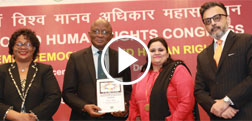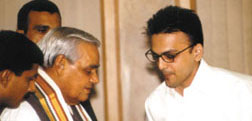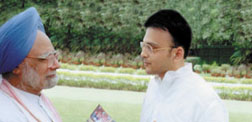|
1. To
work for ensuring that basic human
rights are respected everywhere.
2. To
cooperate to avoid compromising on human
rights for economic or political
expediency.
3. To
recognise democratic institutions as a
fundamental human right.
4. To
work towards the sovereignty and self
determination of entities with
historical, cultural and ecological
identity.
5. To
restrict cooperation with governing
regimes that violate human right.
6. To
actively engage with the Government of
India and other countries to promote
human rights education.
7. To
bring diplomatic and commercial
pressures on regimes that violate human
rights, to ensure that they respect the
basic rights of their citizens.
8. To
keep the interests of disempowered
communities foremost in all dealings
with countries in which human rights
violations occur.
9. To
support the end of colonization and
press for resolution of colonial
conflicts through the UN framework.
10. To
develop a more distinctive and effective
role for the International Court of
Justice in the field of human rights.
11. To
support through the UN framework,
democratic and economic reforms in
countries coming out of totalitarian
control.
12. To
promote a culture for educating the
citizenry that cultivation and promotion
of human rights culture is the sine qua
non for the smooth functioning of the
organs of a democratic State and for the
kind of development that results into
overall development of the society.
13.
To train the young men and women for
facing the challenges of the
pluralistic society and the rising
conflicts and tensions in the name
of particularistic loyalties to
caste, religion, region and culture.
14.
To study the effects of draconian
laws and unlawful use of State's
machinery and force by the
enforcement agencies.
15.
To prepare case studies on the
rising custodial deaths, killings in
encounters and related issues for
ensuring that human rights education
must address the need of evolving
new structures of knowledge and
accountability to impart new skills
and sensitivities amongst holders of
State power so as to make them more
responsive to the culture of human
rights and values of democracy.
16.
To necessitate human rights
education to evolve strategies and
schemes for tackling such attitudes
like employing bonded labour,
practising untouchability,
perpetrating sati and help members
internalise more humane and
egalitarian approach in their social
relations.
17.
To help stop legal social and
economic discrimination against
women and their exploitation in
different ways.
18.
To promote human rights education as
a catalyst in bringing out
attitudinal and social change among
the management of fire works, glass,
stone crushing and related
industries for reducing the
prevalence of child labour in these
and other hazardous industries to
zero.
19.
To create an environment as well as
an understanding that human rights
can easily become vulnerable to
abuse of various structures and
processes of power.
20.
To ensure comprehensiveness and
incorporation of national, regional
and international perspectives
related to human rights.
21.
To study the philosophical and
cultural basis and historical
perspectives on human rights.
22.
To examine the inter-dependence of
and linkages between human rights
and democracy, pluralism,
development, ecological balance,
peace and harmony at the national
and international levels.
23.
To study the historical context,
colonialism and post colonialism,
post independence national
development, protection regime
especially for the week and
marginalised groups including
minorities and for women and
children.
24.
To study and prepare reports on the
violation of human rights by the
State and its agencies - the police
and criminal justice system
inconsistent with human rights
norms.
25.
To suggest action for violation of
rights by armed political groups and
terrorists.
26.
To work against intra-social
violation of rights of the poor and
weak by the dominant groups.
27.
To effectively work for reducing
gender inequalities, exploitations
and injustices.
28.
To provide legal aid and advice for
the indigent and weaker sections of
the society.
29.
To work in close cooperation with
National Human Rights Commission and
other Statutory Commissions on
Women, Minorities, SC and ST and
Linguistic Minorities, NGOs and
Media Organisations for promoting
Human Rights Education.
30.
To study the texts, treaties,
arrangements and structures
innovated by the international
community in the post world war
period for the protection of human
rights, effect of cold war on the
status and functioning of various
institutions and structures
organised for promotion and
protection of human rights.
31.
To promote the role of developing
societies vis-a-vis human rights.
gotop
32.
To study the causes of success and
failure of institutions like UN and
its specialised bodies like UNHCR,
UNHCHR, UNESCO, WHO, ILO vis-a-vis
human rights.
33.
To collect data related to the
existing educational and training
facilities in the areas of human
rights and civil liberties in
different parts of the world in
general and the developing countries
in particular for designing a need
based Bachelor's, Master's and
Doctoral Programmes in Human Rights
and Civil Liberties.
34.
To aid in organising conferences,
seminars, meetings, discussions,
debates, study courses, collection
of statistics, exhibitions, shows,
tour trips etc.
35. To publish books, encyclopaedias,
monographs, journals and directories
on human rights.
|







